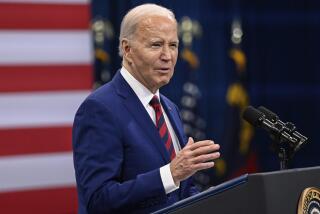Moderates win the day in off-year election
Republican Gov. Chris Christie rolled to easy reelection Tuesday in New Jersey, setting up an expected 2016 presidential bid, while former national Democratic Party Chairman Terry McAuliffe squeezed past his tea party Republican opponent to seize the Virginia governor’s mansion.
Elsewhere, New York City chose Bill de Blasio as its first Democratic mayor in two decades; Boston elected the favorite of organized labor, Democratic state Rep. Marty Walsh, to replace long-serving Mayor Thomas M. Menino; and Detroit selected former hospital executive Mike Duggan as the city’s first white mayor since the 1970s.
In an intraparty ballot, Bradley Byrne, the pick of the GOP business and political establishments, fended off a tea party challenger to win an open Alabama congressional seat.
In Colorado, voters overwhelmingly rejected a nearly $1-billion tax increase to boost education funding but imposed statewide sales and excise taxes on recreational marijuana. Texans turned down a plan to convert Houston’s Astrodome into a convention hall, likely bringing on the wrecking ball.
The off-year election offered a few clues — though nothing certain — about the upcoming midterm campaign in 2014 and, beyond that, the wide-open race for the White House.
It was a good day for moderation, relatively speaking. The winners of the gubernatorial races and the Alabama contest shunned the hard-edged partisanship that has become the norm in Washington; attacks on the federal healthcare law failed to rescue Republican Ken Cuccinelli in Virginia; and Christie’s embrace of President Obama only served to bolster his bid for another term.
In his victory speech Tuesday night in Asbury Park, Christie pledged to govern “with the spirit of Sandy” — a reference to the natural disaster that brought him and the president together, and perhaps a hint at how he might pursue a run for president.
The most consequential results, though, may have come in Virginia, which has become a bellwether in national politics, perfectly matching the voting percentages in the last two presidential races.
Cuccinelli’s positions — fierce opposition to abortion and same-sex marriage, denial of climate change and relentless criticism of Obama — made the state attorney general a favorite of Christian conservatives and tea partyers. But they also placed him at odds with many centrist voters — especially women — allowing McAuliffe to win in a race that proved much closer than polls suggested.
A prodigious fundraiser and close confidant of the Clinton family, McAuliffe was seen as a flawed candidate by many in his own party. He unsuccessfully sought the nomination for governor four years ago and was dogged by controversies surrounding his aggressive fundraising tactics and private business dealings.
PHOTOS: 2013’s memorable political moments
But those negative attributes receded as Cuccinelli was tainted by a criminal investigation into gifts received by Virginia’s Republican governor, Robert McDonnell — a form of guilt by partisan association — then buried in an onslaught of Democratic attacks over the government shutdown and issues like abortion and contraception.
Many of those voting for McAuliffe said they did so out contempt for his opponent.
“I was more excited to vote against Cuccinelli than for McAuliffe,” Lauren Durden, a 41-year-old homemaker, said in Herndon, a Washington suburb. “Cuccinelli is way too socially conservative. He is an extremist.”
In New Jersey, by contrast, Christie drew widespread praise as he cruised to a second term. Many cited his hands-on response to Superstorm Sandy, which battered the Jersey Shore a year ago. He also ran a decidedly nonpartisan campaign; his advertisements ended not with a reference to his party but simply the words “Chris Christie. The Governor.” He repeatedly emphasized his work with Democrats, the state’s majority party.
Drew Moss, 47, was campaigning for Democratic Hoboken Mayor Dawn Zimmer when he paused Tuesday to praise Christie’s fiscal conservatism and his willingness to ignore party labels, particularly when the state needed help from Washington.
“I appreciate that he reached out to Obama,” said Moss, whose home was flooded in the storm. “I like the guy.”
While that quality kept Christie’s Democratic opponent, state Sen. Barbara Buono, from ever gaining a toehold in the governor’s race, it is not likely to help Christie with the partisans who rule the Republican presidential nominating process.
PHOTOS: The battle over Obamacare
Among their grievances, Christie has called for in-state tuition for immigrants in the state illegally — a stance that bedeviled Republican Gov. Rick Perry of Texas when he ran for president in 2012 — and dropped a state lawsuit opposing same-sex marriage. Most infuriating to some was his appearance — and hug — with Obama when the president visited to survey Sandy damage.
Christie seems ready to take on the purists in his party. “I think that the party’s got to focus on winning again,” he said Tuesday in a CNN interview before the polls closed and his reelection was formally sealed. “You know, sometimes, I feel like our party cares more about winning the argument than they care about winning elections. And if you don’t win elections, you can’t govern.”
Next door in New York City, the race for mayor was another anticlimax, although it did deliver the first Democratic mayor in that Democratic bastion since the early 1990s.
The two candidates vying to succeed three-term incumbent Michael R. Bloomberg presented voters with a clear choice. Democrat Bill de Blasio, the city’s public advocate, promised to more closely monitor the controversial stop-and-frisk practice of New York City police, which he equated with racial profiling. He also called for higher taxes on the city’s wealthiest residents to pay for expanded education programs.
Republican Joseph Lhota, who ran the city’s public transit system, defended stop-and-frisk as an effective law enforcement technique and proposed cutting taxes. But without any great personal magnetism or the deep pockets that Bloomberg, a billionaire, brought to bear in his campaigns, Lhota was never able to seriously compete in a city where registered Democrats outnumber Republicans by more than 5 to 1.
Twitter: @markzbarabak
Evan Halper in Herndon, Va., Alana Semuels in Hoboken, N.J., and Tina Susman in New York contributed to this report.
More to Read
Start your day right
Sign up for Essential California for news, features and recommendations from the L.A. Times and beyond in your inbox six days a week.
You may occasionally receive promotional content from the Los Angeles Times.







